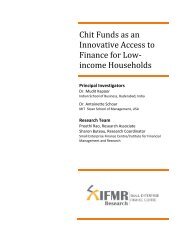Government of India Volume I: Analysis and Recommendations
Government of India Volume I: Analysis and Recommendations
Government of India Volume I: Analysis and Recommendations
You also want an ePaper? Increase the reach of your titles
YUMPU automatically turns print PDFs into web optimized ePapers that Google loves.
Table <strong>of</strong> <strong>Recommendations</strong> 13.8 Listing <strong>of</strong> securities<br />
With respect to listing <strong>of</strong> securities the Commission recommends:<br />
FOUNDATIONS OF CONTRACTS AND PROPERTY<br />
1. Ensuring that exchanges do not arbitrarily refuse to list securities;<br />
2. That persons in control <strong>of</strong> the issuer <strong>of</strong> securities do not discriminate against persons who have bought securities<br />
through the exchange;<br />
3. That in the event the securities are de-listed or cease to be traded, persons who have bought the securities<br />
from the exchange should be able to sell the securities at a fair price; <strong>and</strong><br />
4. That in the event the issuer changes fundamentally through a takeover, persons who do not agree to the<br />
change are able to sell the securities at a fair price.<br />
Exchanges play a central role in the organised trading <strong>of</strong> securities. Table 13.8 provides<br />
the recommendations <strong>of</strong> the Commission with respect to the actions <strong>of</strong> exchanges<br />
in the course <strong>of</strong> listing <strong>and</strong> trading.<br />
13.7. Market abuse<br />
The Commission noted that the underlying principles <strong>of</strong> securities market requires integrity<br />
<strong>of</strong> the information produced by markets <strong>and</strong> fairness <strong>of</strong> the terms in trading in<br />
securities. These can be distorted through various ways which can be classified into the<br />
following categories:<br />
1. Market Manipulation: Organised financial trading produces a stream <strong>of</strong> information, about<br />
prices, spreads or turnover. This information has important ramifications for the economy. Millions<br />
<strong>of</strong> individuals <strong>and</strong> firms make economic decisions as a consequences <strong>of</strong> the trading value<br />
<strong>of</strong> the securities. Any action which generates an artificial modification in these numerical values<br />
has an adverse impact on the market. Hence the law <strong>and</strong> regulatory processes that protect<br />
the integrity <strong>of</strong> information flow in the market. The regulator either on its own or through the<br />
Infrastructure Institution must establish rules, <strong>and</strong> exercise supervision, to identify <strong>and</strong> penalise<br />
attempts by market participants to induce artificial values <strong>of</strong> prices, spreads or turnover.<br />
2. Insider trading: Concerns itself with trading based on non-public information that is availed<br />
through some special relationships <strong>and</strong> is considered an unfair advantage in such markets.<br />
The Commission proposes that the law governing these concerns should be clubbed<br />
together under a general legal principle <strong>of</strong> market abuse. Market abuse can be classified<br />
into:<br />
1. abuse <strong>of</strong> information;<br />
2. abuse <strong>of</strong> securities; <strong>and</strong><br />
3. securities market abuse.<br />
Table <strong>of</strong> <strong>Recommendations</strong> 13.9 Types <strong>of</strong> market abuse<br />
The law governing market abuse must cover the following circumstances:<br />
1. Abuse <strong>of</strong> information: Occurs under three circumstances:<br />
◮ When a person under a legal duty to disclose information does not do so or discloses false or deceptive<br />
information;<br />
◮ When any person uses information gained from sources which are not supposed to disclose information<br />
for purposes <strong>of</strong> trading; <strong>and</strong><br />
◮ When any person circulates false or deceptive information with the objective <strong>of</strong> changing the price <strong>of</strong><br />
a security <strong>and</strong> then trading such security for pr<strong>of</strong>it.<br />
Example: Insider trading, spreading false information.<br />
2. Insider trading: Concerns itself with trading based on non-public information that is availed through some<br />
special relationships <strong>and</strong> is considered an unfair advantage in such markets.<br />
3. Securities market abuse: Occurs when a person, with the intention <strong>of</strong> making a financial gain, artificially<br />
affects the price, liquidity, dem<strong>and</strong>, supply or trading <strong>of</strong> securities or gives a false impression <strong>of</strong> the same.<br />
This may be done by dealing in securities or employing manipulative, deceptive or artificial means.<br />
128 FINANCIAL SECTOR LEGISLATIVE REFORMS COMMISSION



